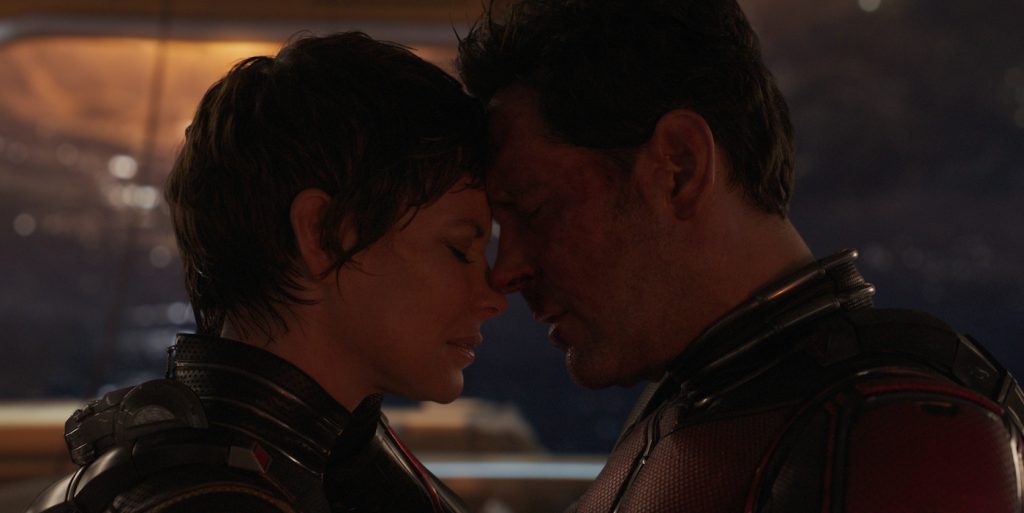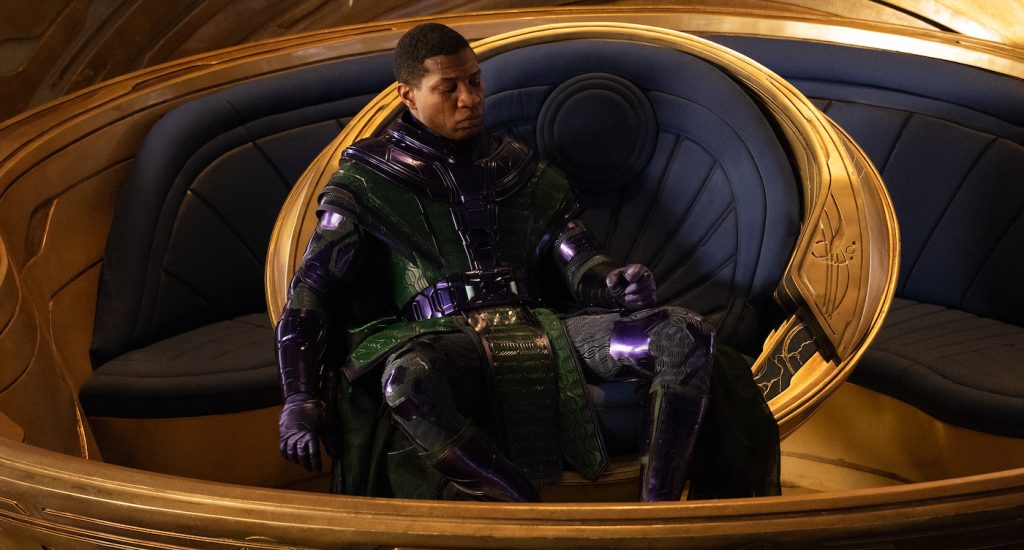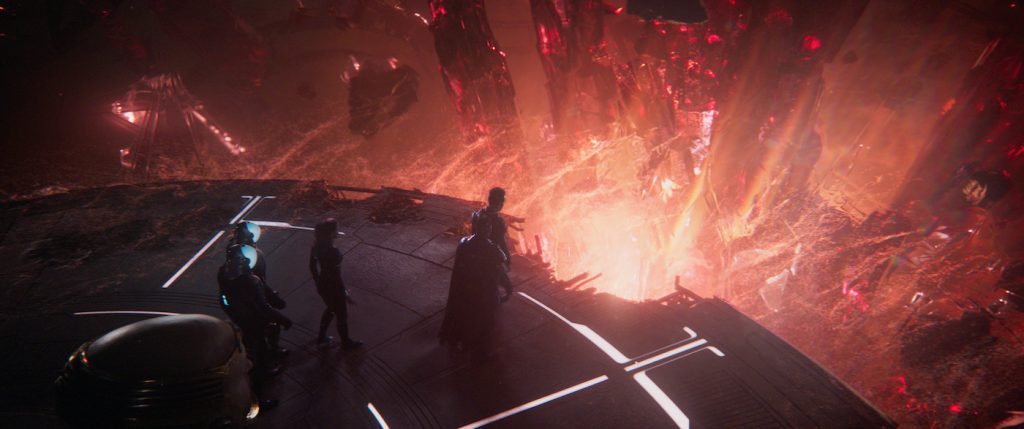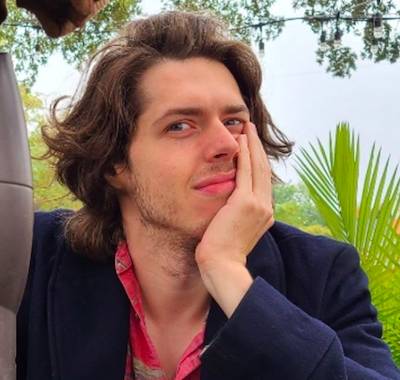“Ant-Man and The Wasp: Quantumania” Composer Christophe Beck on Kang, the Langs, & Depeche Mode
Christophe Beck is one of the most prominent composers in the Marvel sandbox. He not only scored all three Ant-Man films but co-composed Hawkeye and, to great acclaim, WandaVision. After eight years of collaborating with the Marvel team, Beck is well-versed in the MCU’s sonic landscape.
The composer’s first collaboration with director Peyton Reed was years before he composed themes for Ant-Man’s miniaturized adventures. The two first worked together on Bring It On, the quintessential cheerleader film. Even though their stories have grown in scope, most notably in Ant-Man and the Wasp: Quantumania, the duo stay in good touch with their comedy and electronic roots for their latest Marvel adventure.
When you worked on the first Ant-Man, you tried some crazy electronic experiments that didn’t work for the movie. Did you return to any of those early ideas for the quantum realm?
It’s interesting you asked that. I have a real passion for electronic music and modular synthesizers, which is a specific kind of instrument that invites experimentation and is particularly good at making incredibly strange noises. Peyton and I got really excited about getting all insect-y with the modular synth, and we created a suite of demos that was glitchy and experimental and skittery, and it was really, really cool.
It got to a certain point when we realized it was not working with the tone of the movie, which was more of a lighthearted heist/caper vibe. In fact, at one point, Kevin Feige heard some of that stuff and he said something like, “Ah, it sounds cool, but I’m worried people are going to think their speakers are broken when they listen to it.” Peyton and I thought he might be right about that.
We ended up putting that aside and going back to a classic heist feel, picking up on the iconic heist sound of the sixties and seventies. Now, when Peyton called me before Quantumania, he was like, “Hey, I’m excited. We’re going to be exploring this entirely fantastical, strange, and magical universe. Can we pull out some of those little sounds?” I did go back and listen, but it still didn’t feel quite right. There’s something very angular and just too strange about those sounds.
We wanted to make sure the Quantum Realm, particularly when we’re first introduced to it, was a place that inspired awe and that was a place that was beautiful and exotic and not just weird, weird, weird. There’s enough weirdness in the characters that are down there that we don’t need to lean into that so hard with the music. The music could focus more on the emotional quality of what it’s like to be there and less on literally mirroring what we’re seeing. So yeah, it’s interesting you bring that up because that did come up in some early conversations with Peyton.
That was eight years ago. Would you say what a Marvel movie sounds like has changed much since then?
I don’t think so. I think what’s amazing about how Marvel handles their movies, and I think Quantumania is the 31st film in the franchise, is they’re so good at giving each film a unique identity. The first couple Ant-Man movies were heist movies. Captain America: Winter Soldier was more of a political thriller. You end up with these movies that explore different classic genres, and that gives composers a chance to imbue their scores with a bit of a unique identity.
Yet the films all still cohere into a larger narrative.
It’s Marvel. There needs to be a fundamental throughline, not only in the stories that they tell. It’s something else that Kevin and Marvel are incredibly good at, giving each film its own identity while also having a place in the larger story that they’re telling, some more than others, but they all fit in. That has to be reflected musically as well.
Kevin is a big fan of movie music and knows his movie music history and iconography. These are superheroes, so there has to be an element of that classic boldness. Of course, big themes are always welcome when you’re trying to evoke that classic superhero feel. I think he was right; even with moving away from strange, weird electronic noises to a classic heist feel, there still needs to be thematic continuity and bold themes, and that’s what we have in Ant-Man. One of the things that have been consistent in all three Ant-Man movies is his theme, something that I’ve taken great joy in revisiting and exploring and developing and finding new ways to say it musically.
In the first movie, Scott is a thief. Now, he’s saving universes. How’d that huge personality change affect his theme?
I think all you need to do is listen to that first theme, which has a sneaky feel to it. It introduces the idea of getting big and getting small, and you hear that musically as the piece develops as well. It goes from really loud to really soft and sneaky, back to really loud. Skip forward to Quantumania, the variation of the Ant-Man theme in Quantumania, which you hear first; it’s the first track on the album. It’s also the main end credits piece in the movie. Now, it’s high energy; it’s bolder. The orchestra is taking a much bolder approach to state the theme, and there’s a real drive and power to it that reflects the maturity of the character and Scott Lang coming into his own as a hero.
How about for Ant-Man and the Wasp? As a duo and the central romance in the series, did their theme develop?
Yeah, that’s something else we talked about too. Quantumania is the first of the Ant-Man movies where you get a feel for the romantic love between Ant-Man and the Wasp. It culminates at the end when they have a scene where that feeling is at the forefront. Again, we went to the Ant-Man theme, but this time it was played slowly on cellos with flowing strings around it, and I tried to evoke the heart in the theme as well. One of the things I try to do is make sure that [the themes] are versatile, that they can be developed and varied to evoke the full range of emotions that a story might call for. Sometimes it is a challenge to make it work, but it felt natural in Quantumania to find not only the sort of more mature, bold, super-heroic version of that theme but also the more gentle, more bittersweet, and romantic version of that theme.

The first movies were, as you said, heist movies. Here, there are far more moving pieces, characters, different cultures, and a whole new world. How’d the leap in scope provide more challenges?
Besides everything you just said, the sheer amount of music was off the charts for this one. I think the first couple of movies might have had a little over an hour of score in each one. This one we’re talking about is a little over two hours. The music starts and basically never ends until the end of the movie. Sometimes it’s like I’m driving a cruise ship. I’ve got this behemoth under me, there’s all this chaos going on underneath, and I just have to focus on what’s in front of me on that particular day. Working on a film of this size and complexity is a new challenge, for sure.
And a film that’s kicking off Marvel’s Phase 5, no less.
This film has an important role to play in the overarching story, so I took direction from Kevin Feige and Peyton to let me know what is important, what to highlight, what to not worry about so much, and especially in early days when very little of the visual effects are completed, and so much is left to the imagination as I’m working on it.

There is a lot of buildup to Kang the Conqueror in the movie. How’d you want to build up to his reveal, to make him present in the Quantum realm before he even appears?
A lot of what my decisions ended up being, the decisions I ended up making, shifted as I saw more and more footage of Jonathan Majors as Kang. Jonathan is an incredible actor, and he brings so much intensity to the role. One of the things I learned as a composer early in my career is when an actor comes on screen and is killing it, stay out of the way and let the actor do their thing. My job becomes less about merely mirroring what’s already on the screen and amplifying what’s on screen. Opportunities become available for me to add different layers. If Jonathan is bringing so much to his portrayal of Kang, that leaves me free to think about what else is going on in the scene, more subtext and keeping things simple, and letting his performance carry the day.
At first, my themes for Kang, I got excited. I wrote this theme for a big Marvel villain, and it was big and complex, and I went through a process of simplifying and simplifying until his performance could really speak. Also, the first time we see Kang in this movie, he’s not at his full power. He’s confused. He doesn’t know where he is. He’s exiled. He’s trapped and lonely, and so when we first hear Kang’s theme, it’s a little bit more melancholy than later on when it blooms into his full malevolent power.
When he goes full-on villain at the end, do you still want to keep those notes of melancholy? Or do you want a blasting sound of villainy?
That hearkens back to what we were talking about earlier with the Ant-Man theme. Kang’s theme, just like the Ant-Man theme, depending on how I treat it and depending on what other phrasings and chords and harmony are underneath it, can shift from something more melancholy to something more malevolent. One of the things I noticed is when there’s an actual chord progression underneath a melody, that brings a little bit more emotionality to it, a little more heart, and a little more musical direction.
Eagle-eared listeners to the movie score will notice as the film progresses I rely less on chord progressions and more on static harmony, which gives a more driving, more ambitious, more insistent feeling to Kang’s theme. Of course, the instruments that his theme plays on as well have a lot to do with it. We have a processed solo violin. It doesn’t sound that much like a violin, just enough to make it feel a little bit familiar in the early scenes with Kang. As it progresses, I bring in the rest of the orchestra, and by the end, we’ve got all 80 musicians blasting away.
Before the film reveals MODOK’s identity, the track “The Hunter” is hilarious because it plays this ridiculous character deadly straight and serious. Was that a lesson from your days of scoring comedies?
Absolutely. I think a lot of comedy scoring is taking a character’s inner emotional landscape and amplifying it and putting it on steroids. A lot of comedy scoring, effective comedy scoring, is not making funny music to help the audience laugh, but to get inside characters’ heads and exaggerate it, and that’s what brings the permission to laugh in the audience. We did that a lot in the score, especially once MODOK’s face is revealed, and we see him for the ridiculous character that he is. The track you mentioned, “The Hunter,” occurs at a point in the movie when we haven’t seen his face yet, and we wanted to sell the idea that MODOK is this unstoppable killing force and feared by all, a terror-inspiring presence in this world, and that’s why we really went for it in that track.
How’d you want to strike the balance of familiar and otherworldly within the Quantum Realm?
You know, we’ve had glimpses of the Quantum Realm in the previous two movies, not enough to warrant diving in and giving the Quantum Realm its own sonic universe. This was the first opportunity. As I mentioned, Peyton and I had early conversations about wanting to make sure that the Quantum Realm had a unique sound to it, and we both love electronic music, so I pulled out my synths for it. We went through a pass of the score early on where we watched the first four reels in a run one day and we were like, whoa, this score feels very dark and intense, and I think we need to find the fun again. We need to give the Quantum Realm a proper theme in the classic tradition of movie themes to make it feel a little bit less angular and a little bit less weird. We wanted to make sure that we grounded it a little bit so that audiences could appreciate the beauty and the wonder and the exoticism of this heretofore unexplored universe.

From what I’ve read, you are a huge Depeche Mode fan. How much influence would you say they have on you when you compose electronic music for a movie like Quantumania?
By this point, their music, their melody writing, and the phrasing of their melodies is so baked into my DNA I don’t even notice it anymore. I went to a show at the Hollywood Bowl that they played about eight or nine years ago, and it was the first time I’d really had an opportunity to revisit their music. First of all, I loved the show, but also I felt I needed to take a bit of a cold shower after because it was just like, oh, that, that’s where I get that. Oh, that too. The way they turn the phrase here and the way that note matches up against that chord, it’s like, oh, that comes from this song. It was surprising and kind of wonderful to me that I was able to connect those dots and see how big of an influence they are.
For more on all things Marvel Studios, check out these stories:
Marvel Studios Boss Kevin Feige Says “Spider-Man 4” Script Being Written for Tom Holland
“Deadpool 3” Adds Emma Corrin to Cast Alongside Ryan Reynolds & Hugh Jackman
“Guardians of the Galaxy Vol. 3” Trailer Unleashes Adam Warlock on the Galactic Gang
Featured image: Paul Rudd as Scott Lang/Ant-Man and Jonathan Majors as Kang the Conqueror in Marvel Studios’ ANT-MAN AND THE WASP: QUANTUMANIA. Photo by Jay Maidment. © 2022 MARVEL.



